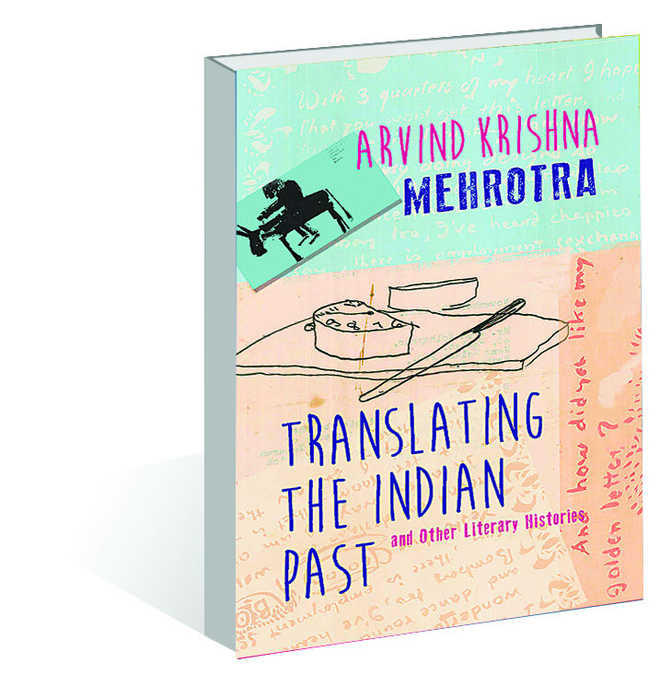AR Venkatachalapathy
Literary malefactors are of two kinds, the average and the mediocre, who are both prolific and prolix, and the brilliant who write too little. Arvind Krishna Mehrotra must surely top the second list. Mehrotra’s career spanning half a century has only the following to show: collected poems of some 300 pages; two slim volumes of translations — of Gathasaptasati and Kabir, a book of essays, Partial Recall: Essays on Literature and Literary History and some edited volumes.
At one point in this book he mentions that his wife chides him for never taking a holiday. I wonder what he does if he is always at his working table. Does he fear that every written word came with a government tax on it? So when a new book comes out of his stable the connoisseur’s ears necessarily prick up. Translating the Indian Past... does not disappoint. It is a subtle feast for readers who value words in a world where language is the most debased commodity.
This carefully produced book — I could spot only two typos, possibly three — does not carry an index. If it did, it would have only one entry: Arun Kolatkar. The rest would be all sub-entries. So fully does India’s greatest modern bilingual poet dominate the book. That so much should be written about one of the most secretive literary personalities is indeed ironical. It demonstrates Mehrortra’s commitment to making the full oeuvre of this cult figure accessible to readers.
The central piece, I Love You, Idiot, running into about 80 pages, reproduces the letters mostly written by Kolatkar to his wife of 15 years, Darshan Chhabda. Modestly described by Mehrotra as just a transcription, it is masterfully structured. When the correspondence begins, Kolatkar is barely 22 and is new to the English language: in a manner of speaking, he is wooing both his beloved and the language. If you expected cloying sentimentality and romance, you would be disappointed. Statements like ‘You are teaching me pain’, and ‘Find for me a rhyme for “you”’ notwithstanding, Kolatkar is already discovering his own distinctive sparse conversational style mixed with Americanisms. The text is enlivened by Kolatkar’s own drawings and holographs that went with the letters.
I Love You, Idiot is an extraordinary text that can stand comparison to Keats’s letters to Fanny Brawne. Mehrotra follows this up with an evaluation of Kolatkar’s early poems, and contends that they are much more than embarrassing juvenilia. There is also a short essay on Kolatkar’s notebook from the mid 1960s.
Mehrotra mentions in passing about the tradition of ‘Indian poets writing on other poets’ — a noble trait unnoticeable among Indian novelists, he pointedly adds — inaugurated by Toru Dutt. Unselfconsciously perhaps, he follows in the same tradition. The book contains essays on poets known and unknown — Toru Dutt, Srinivas Rayaprol, Eunice de Souza, Adil Jussawalla (though the focus is on his prose) and Reshma Aquil (whom I must confess I have never heard of), apart from Amit Chaudhuri and Vinod Kumar Shukla.
Mehrotra’s project is to demonstrate how Indian English poets ‘vernacularised’ and ‘indigenised’ the colonial language, and save them from the enormous condescension of being ‘Shakespeares in sarees, Shakuntalas in skirts, poets in drag — the LGBT community of Indian literature’. Towards this end, he does much of literary sleuthing.
Atoning for an earlier statement about Toru Dutt (‘not [one] with whom you could today do business’), Mehrotra discusses some of her poems, and draws attention to an essay that she wrote about An Eurasian Poet, as early as in 1874. The poet that she designated as such was a Creole, writing in French from the indentured colony of Mauritius, Leconte de Lisle.
There are many such intellectual surprises waiting to jump at the reader. For instance, Mehrotra writes of a senior colleague of his in the Allahabad University, Rabindra Deb, who presciently and perceptively wrote of Amrita Sher-Gil as early as in 1937.
The essay on Srinivas Rayaprol, an aspiring poet who went to Stanford to study engineering in the late 1940s, and his correspondence with William Carlos Williams is a gem.
Mehrotra’s classic essay is called Partial Recall. There is much of partial recall in many of these essays, as he unobtrusively weaves in personal memoir when the occasion demands it. His digression into the working of the English department in Allahabad University had me in splits.
There is not a page in this book without an interesting phrase, a sensitive observation, a deeply thought-out idea or a brilliant metaphor, all framed within a context of an undeclared call to write a literary history of India.
Unlock Exclusive Insights with The Tribune Premium
Take your experience further with Premium access.
Thought-provoking Opinions, Expert Analysis, In-depth Insights and other Member Only Benefits
Already a Member? Sign In Now











